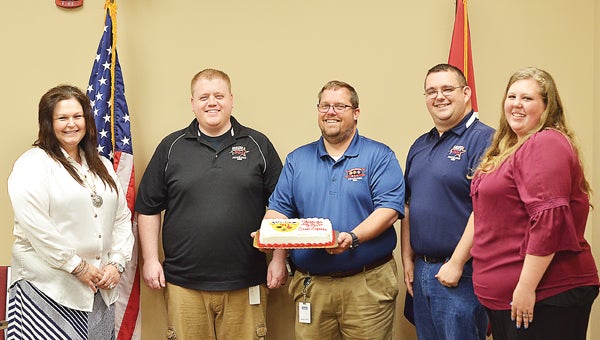Unseen Heroes: Dispatchers honored during Dispatch Appreciation Week
Published 8:25 am Wednesday, April 13, 2016

Star Photo/Rebekah Price
Assistant Managers Kimberly Potter (left) and Autumn Matherly (right) with Cash Express represent just one company out of a number of others that are taking the time this week to show appreciation for the dispatchers behind the scenes on every Carter County emergency. (From left to right) Dispatcher Jesse Harris, Director Dale Blevins and GIS/IT Administrator Chris Sims with Carter County Emergency Communications were grateful for the recognition and cake.
The calm voice on the other end of the line when you report a fire, medical emergency, theft, abuse, car wreck or other emergency is the sound of a Carter County dispatcher doing his or her job, and Emergency Communications Director Dale Blevins said it’s not an easy job to do.
“They may not be on scene, but they interact with people on the worst days of their lives, and they have to process that high level of stress,” said Blevins.
On Tuesday, Elizabethton Cash Express assistant managers Autumn Matherly and Kimberly Potter delivered cakes to the dispatchers at the 911 Communications Center on Sycamore Street and at the Carter County Sheriff’s Office. They represent one of a number of local businesses that took the time to show their appreciation for the commitment and around-the-clock service provided by local dispatchers during National Public Safety Telecommunicators Week from April 10-16.
“Many times we recognize the people that we see in the news or in public,” said Gary McNabb, CEO of Cash Express. “However, we often forget the ones behind the scenes that make it work.”
He said the cake is a small token of their appreciation for the telecommunicators’ dedication and service.
Throughout the week, Blevins said the dispatch center will be preparing meals and awarding prizes to telecommunicators, many of which were donated by local businesses.
Sixteen full-time and four part-time dispatchers receive incoming calls and send emergency personnel to the scene of each emergency, 24 hours daily at the Carter County communication center.
“They work long hours and holidays, and most of them love what they do,” said Blevins.
Whether it requires response by one of seven volunteer fire departments (VFD), Elizabethton Fire Department, Carter County Rescue Squad, Elizabethton Police Department, Carter County Sheriff’s Office, dispatchers know who to call. Blevins said they also dispatch agencies like Tennessee Highway Patrol, neighboring VFDs, Tennessee Wildlife Resource Agency, Wings Air Rescue, Wellmont One, state and federal forestry officers and neighboring law enforcement agencies.
Blevins said they average 260 calls daily of combined incoming and outgoing calls. For each incoming call, the dispatcher must stay in contact with the responding agency till the call is cleared, Blevins said.
“We had 54,558 calls for service that an agency responded to for 2015 and an average 100,000 plus phone calls and traffic both incoming and outgoing emergency 911 and non-emergency 7-digit call for 2015,” said Blevins.
A responder is usually on route within two minutes of the time of dispatch, Blevins said, and sometimes with law enforcement, it is simultaneous.
Dispatchers must complete 8-12 months of stringent training before they can do the job, Blevins said, and then they must do continuing education for 18-24 hours each year.
He said if they were not dedicated, they would not want to work that job.
“We’re the first first responders to get people the help they need in the safest, quickest way,” said Blevins.
Gary Smith, director of Carter County Emergency Management Agency said 911 dispatchers have to know quite a bit about each agency to know who to call.
“And they have to be able to remain calm in those circumstances,” said Smith.
Dispatchers in Carter County do double duty taking incoming calls and dispatching emergency personnel. Smith said in some other counties, those are two separate jobs.
In July 2014, the doors opened for the new emergency communication center on Sycamore Street. Blevins said they were also able to upgrade technology. However, he said they still need increased funding for staff salaries and to add staff to their team.
“We’re asking for funding to increase our staff and to pay for the dispatchers we have now,” said Blevins.
He said they have shifted funds to pay salaries, but they need increased funding to be able to offer competitive pay to dispatchers.
“We also have to upgrade our radio system,” said Blevins. “Technology is constantly changing, and we now have to replace computer equipment and software.”
Emergency communications is funded through city and county dollars, though residents pay $1.16 monthly on their phone bills to have emergency calling capabilities. Smith said that helps to cover the cost of infrastructural improvements and administrative salaries, but to offer competitive pay to dispatchers the agency will need increased funding from the city and county.
“I’m very grateful for the hard work they do, and we’re trying to show them that this week,” said Blevins.
Some dispatchers will be recognized with plaques and gift cards for excellent communication during the recent officer shooting. The telecommunicators of the year will also be recognized with plaques.
“It’s a very stressful time, and they take time away from their lives because they care,” said Blevins. “Without them, the wheels wouldn’t turn.”



